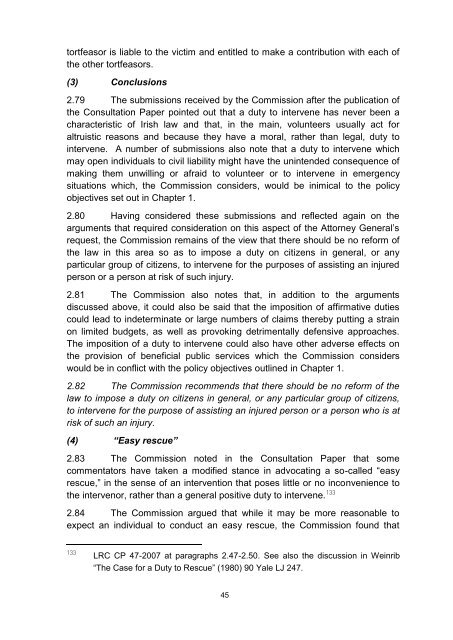civil liability of good samaritans and volunteers - Law Reform ...
civil liability of good samaritans and volunteers - Law Reform ...
civil liability of good samaritans and volunteers - Law Reform ...
Create successful ePaper yourself
Turn your PDF publications into a flip-book with our unique Google optimized e-Paper software.
tortfeasor is liable to the victim <strong>and</strong> entitled to make a contribution with each <strong>of</strong>the other tortfeasors.(3) Conclusions2.79 The submissions received by the Commission after the publication <strong>of</strong>the Consultation Paper pointed out that a duty to intervene has never been acharacteristic <strong>of</strong> Irish law <strong>and</strong> that, in the main, <strong>volunteers</strong> usually act foraltruistic reasons <strong>and</strong> because they have a moral, rather than legal, duty tointervene. A number <strong>of</strong> submissions also note that a duty to intervene whichmay open individuals to <strong>civil</strong> <strong>liability</strong> might have the unintended consequence <strong>of</strong>making them unwilling or afraid to volunteer or to intervene in emergencysituations which, the Commission considers, would be inimical to the policyobjectives set out in Chapter 1.2.80 Having considered these submissions <strong>and</strong> reflected again on thearguments that required consideration on this aspect <strong>of</strong> the Attorney General‟srequest, the Commission remains <strong>of</strong> the view that there should be no reform <strong>of</strong>the law in this area so as to impose a duty on citizens in general, or anyparticular group <strong>of</strong> citizens, to intervene for the purposes <strong>of</strong> assisting an injuredperson or a person at risk <strong>of</strong> such injury.2.81 The Commission also notes that, in addition to the argumentsdiscussed above, it could also be said that the imposition <strong>of</strong> affirmative dutiescould lead to indeterminate or large numbers <strong>of</strong> claims thereby putting a strainon limited budgets, as well as provoking detrimentally defensive approaches.The imposition <strong>of</strong> a duty to intervene could also have other adverse effects onthe provision <strong>of</strong> beneficial public services which the Commission considerswould be in conflict with the policy objectives outlined in Chapter 1.2.82 The Commission recommends that there should be no reform <strong>of</strong> thelaw to impose a duty on citizens in general, or any particular group <strong>of</strong> citizens,to intervene for the purpose <strong>of</strong> assisting an injured person or a person who is atrisk <strong>of</strong> such an injury.(4) “Easy rescue”2.83 The Commission noted in the Consultation Paper that somecommentators have taken a modified stance in advocating a so-called “easyrescue,” in the sense <strong>of</strong> an intervention that poses little or no inconvenience tothe intervenor, rather than a general positive duty to intervene. 1332.84 The Commission argued that while it may be more reasonable toexpect an individual to conduct an easy rescue, the Commission found that133LRC CP 47-2007 at paragraphs 2.47-2.50. See also the discussion in Weinrib“The Case for a Duty to Rescue” (1980) 90 Yale LJ 247.45
















